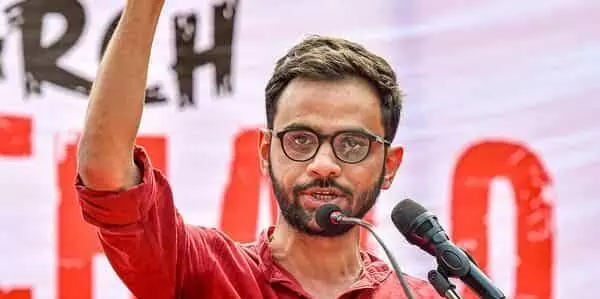
UAPA, COVID, delayed trial make political prisoners' life miserable: Umar Khalid
text_fieldsNew Delhi: Months after his arrest under the UAPA Act, Delhi riots accused Umar Khalid has released a letter to the public regarding his anxieties for friends and relatives during the COVID-19 pandemic as well as condemning the lack of progress in his case.
"Over the past one month, as the second wave of Covid-19 ravages India, I have not spent a day or night locked up in my cell without extreme anxiety – worried about my family and loved ones," Khalid's letter reads, as quoted by the Print. "One tries not to think too much by trying to distract oneself, but the news of death and despair that the newspaper brings every morning is so overwhelming that fending off the worst possible thoughts is just not possible."
He also offered commiserations for the death of Mahavir Narwal, the father of his fellow co-accused Natasha Narwal, from COVID-19. Khalid also highlighted the fact that political prisoners were ignored in situations such as these.
Khalid spoke out about his lack of time on call with relatives as well as the helplessness of not being able to be with his family even as his mother contracted COVID-19 and his uncle was left battling for his life after oxygen levels dropped, calling it "excruciatingly cruel". Khalid himself recently recovered from COVID-19 which he contracted in jail.
"Life in jail is quite difficult even in normal times. I have spent the last eight months alone in a cell, locked up for over 20 hours a day on several occasions. But the ongoing health crisis has increased the difficulties of prison life manifold..." the letter reads.
"I wish people spared a thought for political prisoners and our families; for Mahavir Narwal, who not only suffered from Covid-19 at the end but also from a year-long agonising wait longing to see his daughter free. I wish people also spared a thought for Natasha, who could not be with her father in his last moments, but three weeks after cremating him has to once again return to jail," Khalid wrote.
The activist also pointed out that with the spread of COVID-19, his own situation had been worsened by the fact that judges, lawyers and court staff had been steadily falling ill, delaying the judicial process even longer. After the first arrest 14 months ago, the trial had not even begun for the 16 people arraigned in the case Khalid claimed.
"While in quarantine, I read about the High-Powered Committee appointed by the Delhi High Court, contemplating like last year the release of prisoners on emergency parole/interim bail due to Covid-19," Khalid's letter reads. "I knew from the experience of last year, and it was subsequently confirmed, that those arrested under the Unlawful Activities (Prevention) Act, or UAPA, will not be eligible for any interim relief."
"As a law, the UAPA makes a mockery of the Supreme Court's observation that bail is the rule and jail an exception. For all effective purposes, the UAPA turns this principle on its head by requiring an accused person to prove his innocence and thereby proceeding on a presumption of guilt, even in order to grant bail. That too, without the benefit of a trial," he added.
The letter was narrated to Banojyotsna Lahiri and Anirban Bhattacharya from Tihar jail before it was released to the public.

















